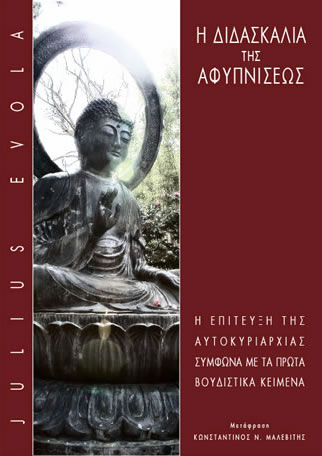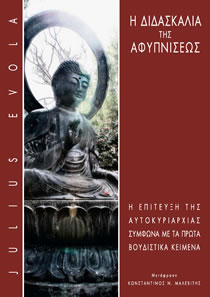
| Greek Version |
One of the greatest philosophers of modern times, Julius Evola (1898-1974), is also considered to be one of the most important representatives of Inner Tradition.
The noble, esoteric and heroic way of life that he followed accompany a series of work in which also belongs the present book.
In The Doctrine of the Awakening Evola offers an excellent analysis of the oldest Pali texts of original Buddhism, which reflect the cultural, metaphysical and transcendental content of the in question eastern tradition.
We have to do with a teaching intended to an elite of ascetics of a higher spiritual nobility that moves against the current, a teaching invisible for the common men and the mortal natures who live in the shadow of ignorance.
Buddhism particularly in its fundamental original form, opposes anything that would remind religion, mysticism or characterised by the concepts of faith, devotion, dogmatic rigidity and conversion.
On the contrary, asceticism is praised in its authentic sense that is to say that of practical exercise, discipline and learning. At the same time self-concentration is projected together with the power of will, the control of mind and thought, the moral behavior, the monasticism.
Ekattam monam akkhatam - Solitude is called wisdom. The one who is alone will find that he is happy, lord unto himself, artificer of his own destiny.
The person comes to confront, a relentless analysis of himself, as well as of the conditioned nature of his existence.
He enters into an everyday battle, where there is no cease, into a heroic fight of an intellectual and spiritual kind. He prefers to die in the battlefield fighting for the realisation of the extreme apex, than to live as one vanquished.
He walks the path of awakening, towards enlightment. What only matters now is each single moment.
He has already acquired control on himself, he is possessed by awereness, calmeness, equnimity and dignity. Katam karaniyam – Done is what to be done.

| Home Page | Julius Evola | Archieve | Info | News | Contact | © 2010, JuliusEvola.gr |

